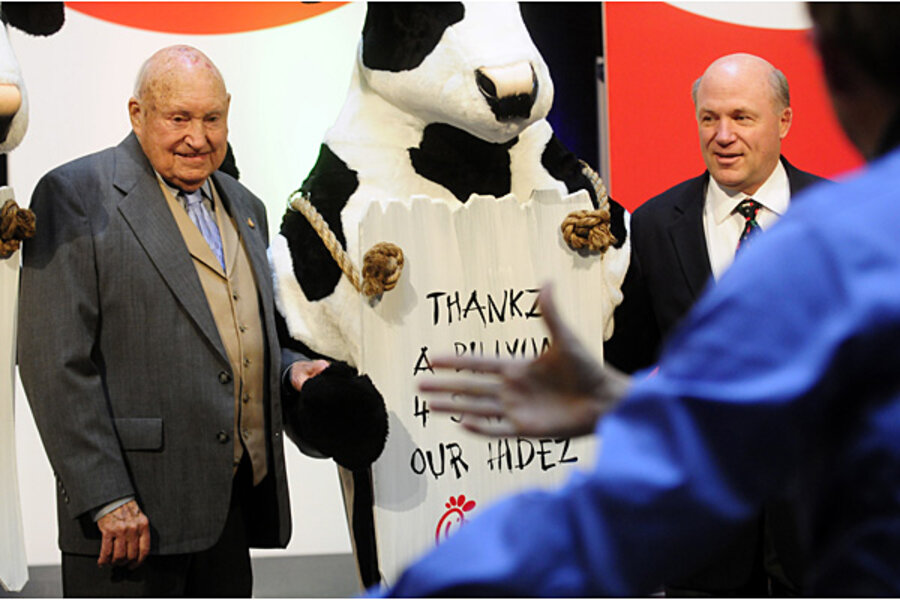How Chick-Fil-A's S. Truett Cathy pioneered the charitable business
Loading...
With the death of S. Truett Cathy on Monday, the world lost a pioneer of the charitable business model.
Mr. Cathy was the owner and creator of Chick-fil-A, a fast-food chain worth $5.5 billion. Early on, Cathy made giving back to the community one of the chief markers of the Chick-fil-A brand. To date, Chick-fil-A has donated $68 million to more than 700 educational and charitable organizations, according to the company.
"I'd like to be remembered as one who kept my priorities in the right order" Cathy is quoted as saying. "We live in a changing world, but we need to be reminded that the important things have not changed. I have always encouraged my restaurant operators and team members to give back to the local community. We should be about more than just selling chicken, we should be a part of our customers' lives and the communities in which we serve."
Cathy has said his beliefs pushed him to keep Chick-fil-A a private company, passing up the big payday he would get from taking the company public. He said that he wanted full control over the company to ensure that Chick-fil-A kept giving back to the community.
“As a public company, I’m sure somebody would object to our generosity,” he said in 1998, according to Businessweek.
Cathy's charitable giving was grounded in Christian faith, which also kept him from opening the restaurant on Sundays. He believed that Sunday should be a day to worship and to spent time with family. Many said the move cost him millions, but Chick-fil-A still outperformed its chief competitor, KFC, in sales last year – with half the locations.
“I see no conflict whatsoever between Christianity and good business practices. … People say you can’t mix business with religion. I say there’s no other way,” Cathy told the Atlanta Journal-Constitution in 2008.
In 1984, Cathy started the WinShape Foundation, a nonprofit that funds 13 foster homes, a wilderness program, marriage counseling, retreats, and youth camps.
A sense of public responsibility has become a focal point of branding for a growing number of fast food companies in recent years. Panera, for example, focuses heavily on food security issues with its pay-what-you-can locations. Chipotle's cause is responsible food sourcing, with a stated commitment to sustainable, non-GMO ingredients. In June, Starbucks made headlines when it announced it will pay for employees to go to online classes at Arizona State. That was a move taken straight from Chick-Fil-A, which began offering $10,000 college scholarships for employees and non-employees to attend Berry College in Rome, Ga. through the Winn Foundation in 1984. Today, the scholarship gives up to $32,000 towards a college degree from Berry. The program has provided $8 million in scholarships to 1,200 people since its inception.
But the religious underpinnings of Chick Fil-A's charitable efforts haven't escaped controversy. The company faced boycotts and lost endorsement partnerships after president Dan Cathy made public comments against gay marriage 2012. The Human Rights Campaign, the largest gay rights group in the US, released information saying some of Chick-fil-A’s donations were going to groups opposed to same-sex marriage. The statement and donations caused some to protest the company. In late 2012, Chick-fil-A said it would stop funding groups with anti-same-sex marriage stances.
Still, with the passing of Cathy, the world lost a businessman who believed corporate profits could be used for good.
“Nearly every moment of every day we have the opportunity to give something to someone else – our time, our love, our resources," he has said in the past. "I have always found more joy in giving when I did not expect anything in return."








